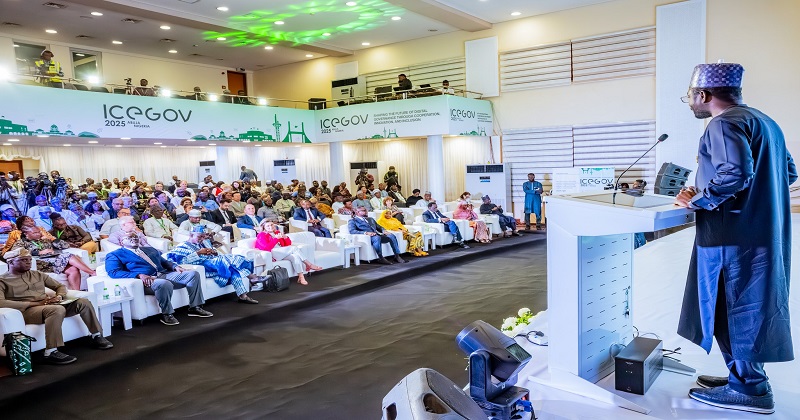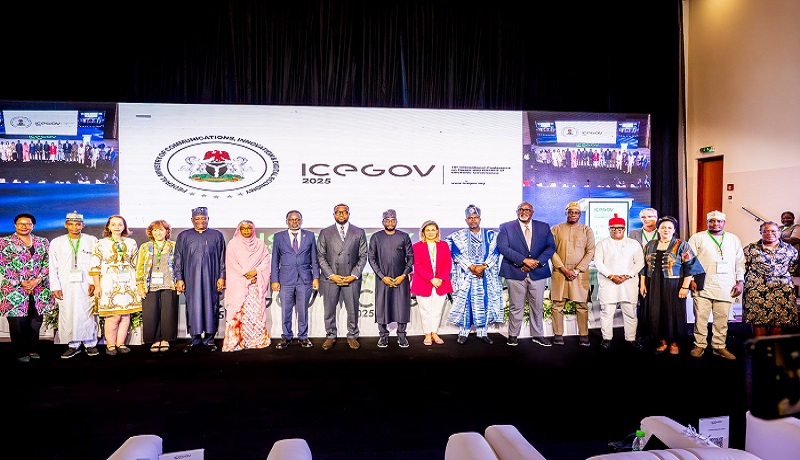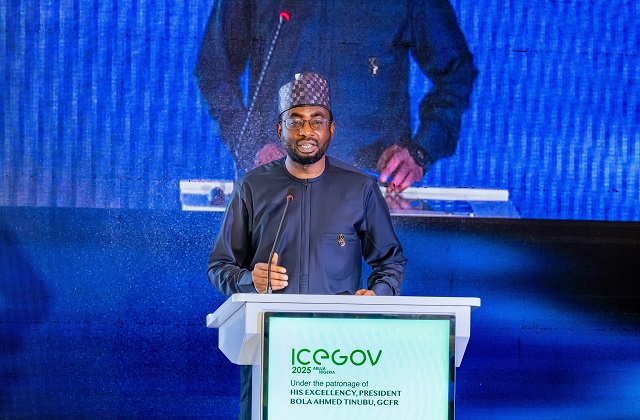The Director General of the National Information Technology Development Agency (NITDA), Kashifu Inuwa, has reaffirmed Nigeria’s commitment to driving inclusive digital transformation across Africa, describing the 18th International Conference on Theory and Practice of Electronic Governance (ICEGOV) 2025 as a milestone in the nation’s journey toward global digital leadership.
Speaking at the conference held at the Shehu Musa Yar’Adua Centre, Abuja, Inuwa explained that hosting the prestigious global event was inspired by the directive of the Minister of Communications, Innovation and Digital Economy, Dr. Bosun Tijani, following Nigeria’s outstanding participation in ICEGOV 2024 in South Africa, where the country’s growing influence in digital policy and research was widely recognised.
According to Inuwa, Nigeria’s digital transformation is anchored on the Ministry’s strategic blueprint, Accelerating the Nation’s Collective Prosperity through Technical Efficiency, which rests on five key pillars of Knowledge, Policy, Infrastructure, Trade, and Innovation, Entrepreneurship & Capital.
He showcased several flagship initiatives under these pillars, including the National Digital Literacy Framework targeting universal digital skills from early education to adulthood; integration of digital literacy into school curricula in collaboration with the Ministry of Education; Civil Service Digital Training Programme with over 24,000 public servants already enrolled; the 3 Million Technical Talent (3MTT) initiative, equipping Nigerians with globally relevant tech skills; and nationwide digital inclusion campaigns for market traders, transport workers, senior citizens, and faith-based groups.
“Digital transformation is not just about technology. It’s about improving how we serve our citizens. Governance must meet citizens where they are, online,” he affirmed.

Inuwa also revealed that Nigeria is making progress on Digital Public Infrastructure (DPI), including a national data exchange platform and a Centre of Excellence for DPI, both designed to strengthen Nigeria’s digital governance architecture and promote Africa’s digital self-determination.
Global AI Governance: Call for Inclusivity and Ethics
Reinforcing the call for equitable and responsible technological advancement, the Rector of the United Nations University and Under-Secretary-General of the United Nations, Prof. Tschilidzi Marwala, urged nations to ensure that artificial intelligence (AI) serves all of humanity, including Africa, if it is to truly advance global progress.
“Artificial intelligence is shaping many areas of our lives, but it must be designed so that it does not leave anyone behind. AI will remain suboptimal until it works equally for all people, including the people of Nigeria and, by extension, the African continent,” he said.
Prof. Marwala, who co-chaired the conference alongside Dr. Tijani, emphasised that AI must be governed by principles of equity, transparency, and ethics, warning that technological progress without inclusivity could deepen existing inequalities.
He also stressed the need for collective decision-making in shaping AI deployment: “Democratisation of AI means not only that people can freely use AI but also that they can collectively decide how it is to be used. Collective decision-making is necessary to address the negative externalities of AI, from job losses to the degradation of our digital commons,” he noted.
He urged policymakers, technologists, and researchers to view AI as a moral responsibility that demands cross-border cooperation to ensure that innovation strengthens humanity rather than divides it.
Nigeria’s Renewed Commitment to Digital Transformation
The conference, themed “Shaping the Future of Digital Governance through Cooperation, Innovation, and Inclusion,” provided a global platform for Nigeria to reaffirm its leadership in Africa’s digital transformation through research, innovation, and collaborative governance.

This aligns with President Bola Ahmed Tinubu’s Renewed Hope Agenda, particularly the pillars of Reforming the Economy for Sustained Inclusive Growth, Enhancing Infrastructure, Improving Governance, and Accelerating Economic Diversification through Digitalisation and Innovation.
In his keynote address, Dr. Bosun Tijani underscored the importance of balancing innovation, research, and regulation to ensure that digital technologies serve the public good and strengthen social inclusion.
“Nigeria stands at the intersection of innovation, youth, and digital transformation. The state of a society reflects the ideas that dominate it. When good ideas strike, nations prosper; when bad ideas prevail, nations decay,” he said.
Dr. Tijani introduced the Source Balance Ratio — a conceptual model illustrating how ideas from government, academia, civil society, the private sector, and development partners shape effective public policy. He cautioned against profit-driven or politically reactive policymaking, emphasizing that research and ethics must guide national innovation frameworks.
“If our ideas are driven solely by profit or short-term politics, we end up with regulations that react to innovation rather than guide it,” he warned.
He also called for stronger collaboration between academia and government to foster evidence-based policymaking and link research to sustainable economic growth.
Global Endorsement of Nigeria’s Digital Vision
Dignitaries at the opening ceremony included Minister of State for Education, Prof. Suwaiba Said Ahmad; Head of the Civil Service of the Federation, Mrs. Didi Esther Walson Jack (represented by Mrs. Fatima S.T. Mahmood); Chairman, Senate Committee on ICT and Cybersecurity, Senator Shuaibu Afolabi Salisu; and Chairman, House Committee on ICT, Hon. Stanley Adedeji, among others.
They collectively commended Nigeria’s visionary leadership in advancing digital governance and socio-technical innovation across Africa. Their remarks underscored the strategic importance of ICEGOV 2025 as a platform for global dialogue on digital policy, AI governance, and ethical technology deployment.
They further emphasized that Nigeria’s digital transformation success depends on multilateral cooperation, institutional capacity-building, and resilient digital infrastructure that promotes transparency, trust, and interoperability.
Established in 2007, the International Conference on Theory and Practice of Electronic Governance (ICEGOV) brings together academia, governments, civil society, and industry to explore the theory and practice of electronic governance.
The conference promotes knowledge exchange and innovation for sustainable development, inclusion, and active citizenship, making it one of the most influential global platforms shaping the future of digital governance.

